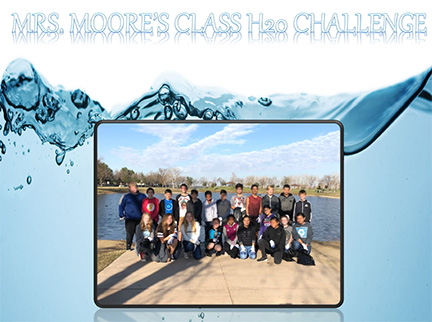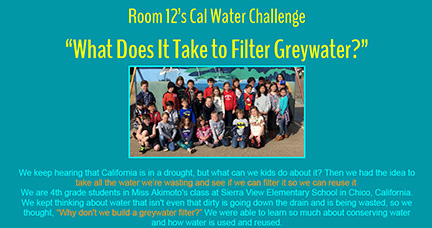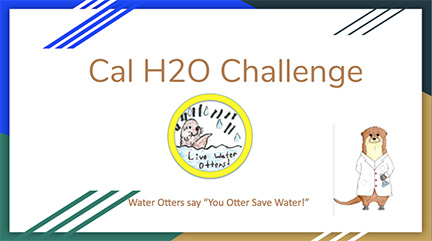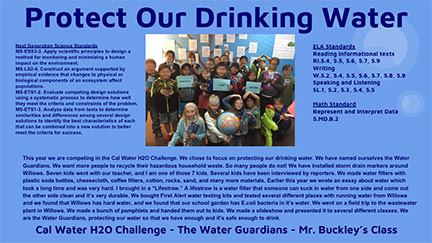The Classroom Challenge is no longer active,
but this site subsection with the former program's handbook, resources, and web series remains available as our Teacher Toolkit to help you tackle your local water issues!
We received many spectacular submissions this year from classrooms throughout California. Once again our team is proud of the amazing work and dedication demonstrated statewide from each and every participating classroom. Thank you for doing your part to care for California’s water!
Learn about our winning classrooms below!
Curious about past winning classrooms?

PROJECT TITLE: Protecting Our Watershed
TEACHER NAME: Julie Moore
CITY: Bakersfield
GRADE LEVEL: 6th
For their project, “Protecting Our Watershed,” Julie Moore's students researched what a watershed is, why it’s important, and how humans can harm and protect it. They also invited a guest speaker from the Water Association of Kern County to reinforce their knowledge. Students then applied their knowledge by cleaning the local watershed at nearby park, The Riverwalk, and collecting and testing water and soil samples. Lastly, students created three public service announcements, held puppet shows for younger students, and designed an informational brochure and website to help spread the word about protecting watersheds to fellow students and the local community.

PROJECT TITLE: What Does It Take To Filter Greywater?
TEACHER NAME: Emily Akimoto
CITY: Chico
GRADE LEVEL: 4th
Inspired by recent droughts, these fourth-graders from Sierra View Elementary worked to filter and reuse greywater rather than waste it. They started by researching greywater, water filters and how much water is wasted per year. The class even visited a California water treatment plant and met with an expert scientist and chemist to reinforce this knowledge. Students then applied their learnings by designing and building closed-system water filter systems. They tested the systems, analyzed results and determined effectiveness of their filtration. Ultimately, participating students gained valuable knowledge on water contaminants, grey water, water filtering, and the need to conserve and reuse water — knowledge that will stay with them for a lifetime.

PROJECT TITLE: Xeriscape!
TEACHER NAME: Caryl Brewbaker
CITY: Menlo Park
GRADE LEVEL: 4th
Students at Oak Knoll Elementary sought to learn and teach others about the benefit of xeriscape gardening on water conservation. They began by learning about the water cycle, global warming, water use and waste, and spoke with a xeriscape gardening specialist. The class then applied their findings by designing and engineering a xeriscape garden at their school complete with drip irrigation and drought tolerant plants. To help spread the word, students gave multiple presentations, designed and disseminated public awareness fliers, and developed a class website including a pa to allow kids and community members to design their own xeriscape gardens.

PROJECT TITLE: Protect Our Drinking Water
TEACHER NAME: Mike Buckley
CITY: Willows
GRADE LEVEL: 5th
For their project, Mr. Buckley’s students were inspired to measure the safety of local drinking water, establish a plan to protect the drinking water, and educate the community on how and why they should help. Students started by learning about drinking water safety: they researched water and wrote essays, met with a local water expert on groundwater, and visited a wastewater treatment facility. Students then applied their findings by installing 25 storm drain markers to ward off littering into the waterways; testing local water quality at 15 different locations; and designing, engineering, testing, and redesigning water filters. Next, students spread their knowledge and findings by presenting to 16 classrooms, creating and distributing a brochure to limit the impact of hazardous waste on the local water supply, and appearing in local newspapers.